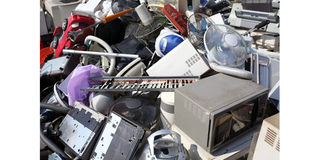Untapped business potential in e-waste

What you need to know:
- E-waste has recently become a growing worry among Tanzanian pollution control specialists, yet it can still be a significant source of revenue
Moshi. Despite being discarded for their real or perceived hazards, electronic waste has a huge business potential.
They can be remanufactured to serve the same purpose and, in so doing, create jobs for unemployed people.
This emerged during the just-ended roundtable to mark the International Day for Zero Waste held here at the national level.
Business stakeholders and environmental experts concurred that they should not be entirely discarded because they can be reused.
“There is a vast, untapped business opportunity in the re-manufacturing of electronic waste”, said Ms Ester Mengi, an executive with the Serenic Africa company.
She elaborated that, globally, over 50 million metric tonnes of electronics are discarded as waste each year.
The round table was organised by the East African Business Council (EABC) with the support of GIZ, a German aid agency.
Speakers at the event said besides the electronics, other types of waste can be recovered, recycled, and reused through the application of relevant technologies. Ideally, electronic waste, or e-waste, is used electronics that are destined for disposal due to their human health effects and pollution.
Yet they can be refurbished and salvaged by recycling through material recovery and later be reused and resold. E-waste is mostly created when an electronic product is discarded after the end of its useful life. But with the rapid expansion of technology and the consumption driven society results in the creation of a very large amount of e-waste.
E-waste has recently become a rising concern among pollution control experts in Tanzania due to increasing quantities from domestic and industrial sources.
Statistics indicate that by 2017, at least 35,800 tonnes of e-waste were generated annually in the country, up from only about 2,000 tonnes in 1998.
Equally debated at the one-day roundtable at a Moshi hotel were pharmaceutical and medical wastes, which have to be disposed of safely to minimise health risks.
Mr John Patrick Mwesigye, Regional Expert on Pharmaceuticals at GIZ-GFA, stressed the importance of regulations and technical know-how in disposing of them “to protect biodiversity”.
Mr Yahya Mbanka, Finance Manager of Azania Bank, said the financial institution was ready to offer financial solutions to small and medium enterprises (SMEs) in waste management.
“The support will extend to the broader circular economy so as to create more jobs for the youthful population,” he pointed out.
The CEO of Moshi-based Kilimanjaro International Leather Industries Company Limited, Mr Masud Omari, said the firm was already recycling leather cuttings and shavings to manufacture other products.
Allen Kimabo from Zaidi Recyclers quoted the United Nations statistics, which indicate that the circular economy offers $4.5 trillion in economic opportunities.
Ms Julia Seifert from NetZero stressed the need for Tanzania to embrace the circular economy model for economic, social and environmental benefits. “It is a model of production and consumption that involves sharing, leasing, reusing, repairing, refurbishing, and recycling existing materials and products for as long as possible. In this way, the life cycle of products is extended,” she added.
She shared studies on generative agriculture, such as coffee by-products used for mushroom farming, agroforestry and sugar industries scaling up their business models to produce biogas, replace fossil fuels and reduce carbon emissions. The round table attracted over 50 actors who learned about business models for the circular economy and shared experiences and success stories in waste management solutions, technologies, innovative projects and programmes in East Africa and beyond.
Businesses should embrace a circular economy to promote sustainable business models, reduce raw material and waste management costs, demonstrate thought leadership and increase societal acceptance and compliance with national, regional and global treaties.




